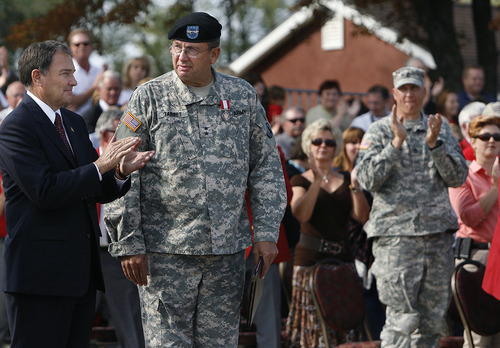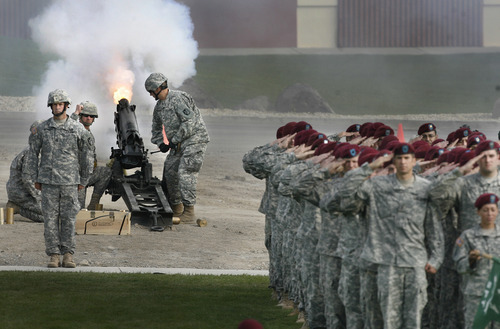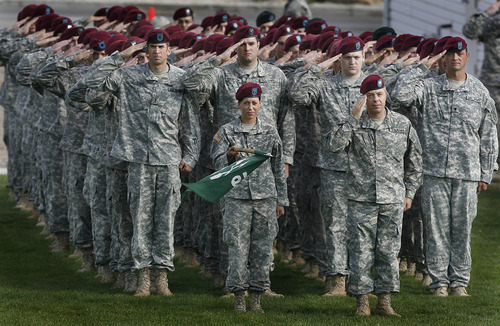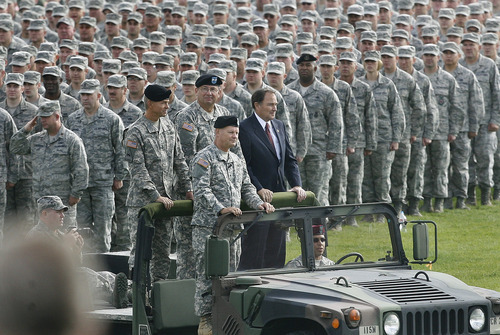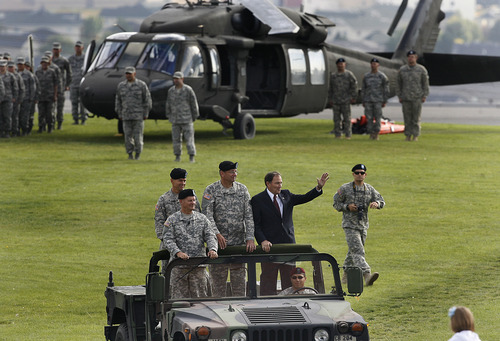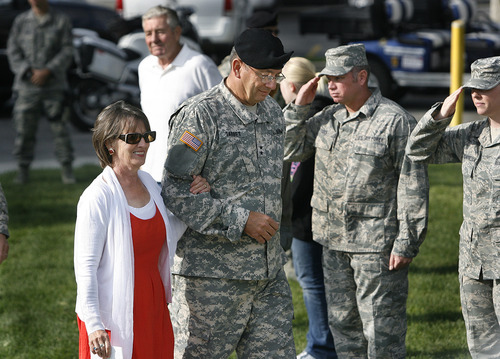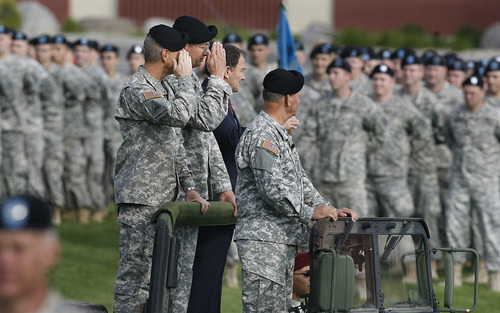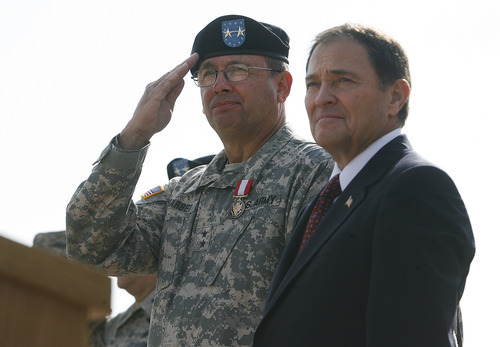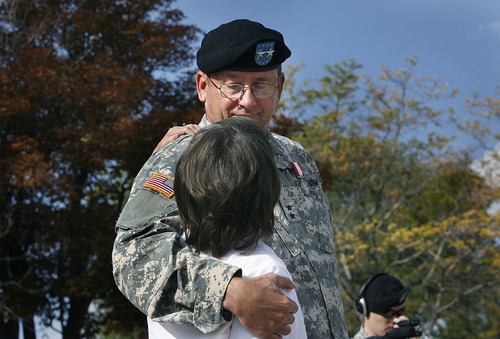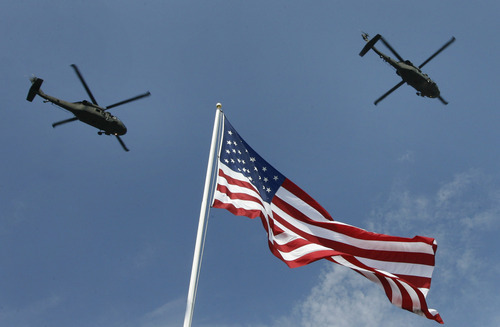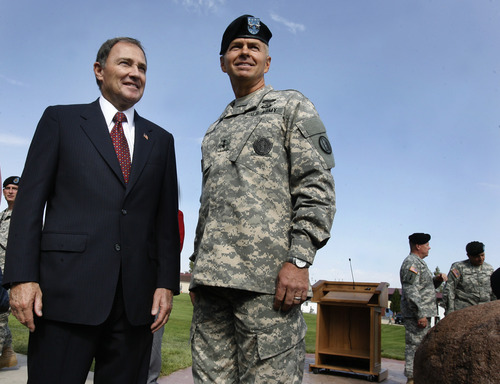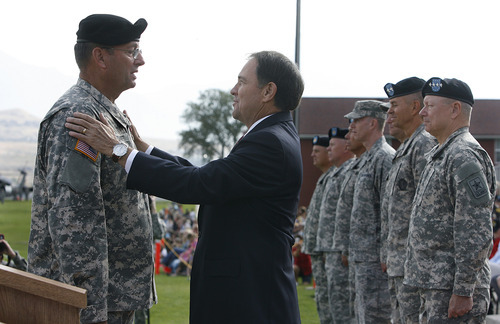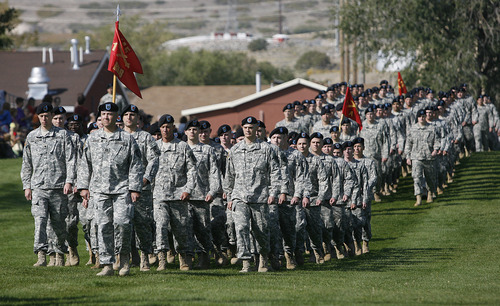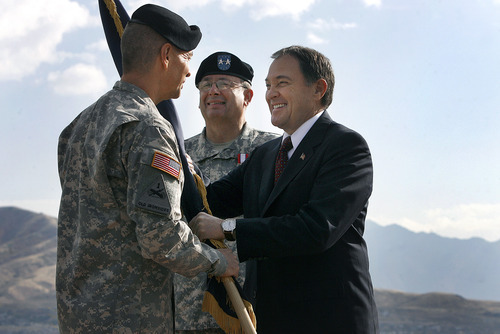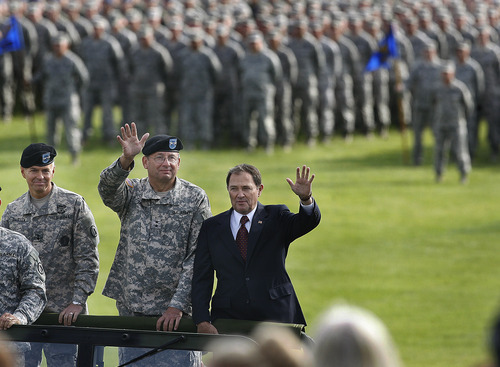This is an archived article that was published on sltrib.com in 2012, and information in the article may be outdated. It is provided only for personal research purposes and may not be reprinted.
Camp Williams • Long after the governor, the top general in the National Guard and the Utah Guard's new leader had left the parade field, Maj. Gen. Brian Tarbet was sharing hugs and salutes with soldiers and their families.
Tarbet, 63, retired Saturday after 12 years as the adjutant general of the Utah National Guard, handing off the Guard's colors to Maj. Gen. Jefferson Burton, 53, before 7,000 soldiers, their families and dignitaries.
Before the change-of-command ceremony, Tarbet was surprised by the unveiling of a monument naming the Camp Williams parade field as Tarbet Field, a moment that triggered tears he fought to master throughout the morning.
"You can't talk about what these soldiers and airmen have done and not get that way," Tarbet said later. "It's an emotional thing."
The change-of-command ceremony made this year's Governor's Day a bigger affair than most, drawing more than 10,000 to Camp Williams in the southwest corner of the Salt Lake Valley. The day gives the governor a chance to review troops and lets the public see Guard aircraft and displays and enjoy a food court and climbing wall.
Donna Kunkel, of American Fork, wiped tears as she waited to give Tarbet, regarded as a soldier's soldier, a hug after the 90 minutes of speeches, ceremonies and parade of companies.
"I want to tell him how much he means to me," she said.
Tarbet had given her family personal attention in a painful time before her husband deployed with the Guard to Iraq, she said.
"My husband doesn't salute … commanders very often. He salutes this man," she said.
Gov. Gary Herbert said Tarbet, who joined the Guard 36 years ago, served with "humility, commitment and honor."
"He has commanded during one of the most, if not the most, tumultuous times in our National Guard history. Eleven years of war takes a toll on all of us," Herbert said.
Gen. Frank Glass, chief of the National Guard Bureau and just recently made a member of the Joint Chiefs of Staff, said Tarbet is "one of the best the military has to offer."
In particular, he praised Tarbet, his "mentor and friend," for coordinating the work of 5,000 Guard troops from 26 states who came to keep the 2002 Olympics safe, all while the Utah troops were preparing for war. Tarbet, in turn, called Glass the "chief architect" of the Guard's service during the Games.
Tarbet was given a standing ovation after the field was named in his honor and again after remarks in which he poetically described today's Guard soldiers and airmen as successors of the Revolutionary War-era minutemen.
"You are patriots all, the finest of your generation."
"We have had losses and wounded," Tarbet said through tears. "We don't forget them and we don't ignore them."
Burton, he said, is the "right man at the right time," and "a wonderful warrior, a decent man and a great leader."
Burton, like the other speakers, praised families of soldiers who "just buck up and move out," like the soldiers and airmen they support.
The new adjutant general was on active duty in the Army from 1982 until 1991, when he joined the Utah National Guard. A longtime Payson resident, he commanded the 1457th Engineer Battalion's 450 soldiers as they deployed to Iraq in 2003. He has been the assistant adjutant general for five years, responsible for training and support of 5,600 soldiers.
Burton recalled those who have died and acknowledged that more soldiers and airmen have returned from Iraq and Afghanistan thanks to advanced trauma medicine, but with "ghastly wounds."
"I am also mindful of those with unseen wounds," he said. "I will stand with you and by you."
The Utah National Guard also got a new leader for its enlisted ranks. Command Sgt. Maj. Michael Miller replaced Command Sgt. Maj. Bruce D. Summers.
Some 650 members of the Utah National Guard remain deployed, most of them in Afghanistan. Small groups from the 19th Special Forces will return home in October and December, the 1st Battalion of the 211st Aviation is due home in January and the 624th Engineering Company is expected home in the spring, possibly in April.


